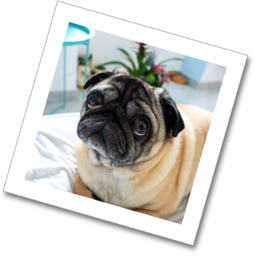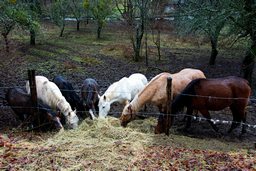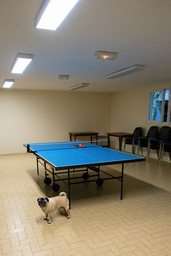
Eukaryotic Me
 We
had just come back from a nice walk where I met seven new friends who
were enjoying some hay for their lunch. But when we returned, my mum
was in a little bit of a bad mood and told us that a
neighbour had said that she thought my dad and I look pretty much the
same. My mum thought it was not a little insulting but my dad just
mulled it over and said that our neighbour was not wrong - me
and my dad do have a lot in common.
We
had just come back from a nice walk where I met seven new friends who
were enjoying some hay for their lunch. But when we returned, my mum
was in a little bit of a bad mood and told us that a
neighbour had said that she thought my dad and I look pretty much the
same. My mum thought it was not a little insulting but my dad just
mulled it over and said that our neighbour was not wrong - me
and my dad do have a lot in common.For example, my dad said that we are both mammals with a rather sanguine attitude to life - it does not take much to keep us contented. I need some cuddles and a good walk twice a day and he needs his books and some wine. And we both like the countryside very much.
But it seems there are other deeper physical similarities - and one of them is that we are both eukaryotes, which are a lot different from all the other organisms which are called prokaryotes. For one, all prokaryotes are really simple creatures, and way too tiny to be seen without a microscope. They are just single-celled organisms like bacteria and they do not have a nucleus or any of the sophisticated functions of an eukaryotic cell.
Me and my dad are made up of cleverer eukaryotic cells with things like a nucleus and organelles such as mitochondria, the Golgi apparatus, the endoplasmic reticulum, etc - organelles are like cute little baby organs and they are all originally adopted billions of years ago from other prokaryotic bacteria. This is a big deal because being an eukaryote is a really special thing, even though the number of prokaryotic organisms probably outnumber us by a lot. By the way, eukaryote is pronounced like "you carry oak", spoken quite quickly and prokaryote is pronounced like "pro carry oak".
The fascinating thing is that we all evolved from prokaryotes initally - and eukaryotes came into existence only when some prokaryotes started living in other prokaryotes. This may have happened when a bacteria attacked and swallowed anothe bacteria but the ingested bacteria did not die but survived and somehow both bacteria decided it was way better if they worked together in a process called endosymbiosis. This allowed eukaryotic organisms to evolve and develop into much larger, complex creatures such as plants, insects, birds, reptiles and mammals such as me and you. If you are curious, my dad says that this adoption of endosymbiosis is a really rare event and has happened only 3 times over the last few billion years. The first instance of prokaryotes co-existing inside other prokaryotes happened around 2.4 billion years ago - and that was when mitochondria was developed. Then 1.6 billion years ago, some cyanobacteria got into some early eukaryotes and became the chloroplasts that enabled these eukaryotes to evolve into the many plants we have today - the chloroplasts allowed plants to obtain energy from the sun via photosynthesis using chlorophyll. Finally, only around 400-500 million years ago, some marine eukaryotes managed to incorporate some red algae prokaryotes into their cells and became seaweed and kelp.
 So
this means that all the cells in my body and in my dad's body are rather special, having
remnants of prokaryotes in them surviving as organelles - and we now
cannot live without these organelles as they are needed to do things like provide
the energy for us to keep warm, move, think, work, etc. For example, the
mitochondria in our cells catalyse a special molecule called adenosine triphosphate
which provides the energy for us to live.
So
this means that all the cells in my body and in my dad's body are rather special, having
remnants of prokaryotes in them surviving as organelles - and we now
cannot live without these organelles as they are needed to do things like provide
the energy for us to keep warm, move, think, work, etc. For example, the
mitochondria in our cells catalyse a special molecule called adenosine triphosphate
which provides the energy for us to live. How this happens is intriguing though to be honest, I tend to fall asleep after a few minutes whenever my dad tries to explain it to me. Usually, I get lost (and sleepy) when he starts on enzymes and the citric acid cycle - I am a just a little pug after all and he usually drones on for over 20 minutes each time he explains how mitochondria work. And then, for some weird reason, I tend to dream about when I will be evolved enough to play ping-pong properly with my dad. He says this may take some time.
Pof the Pug

Return